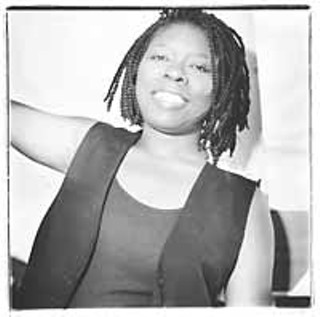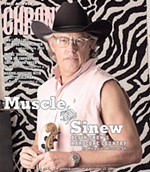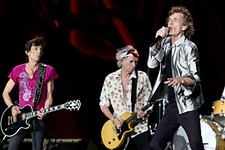State of the Slam
An Update on the 1999 Austin Poetry Slam Team
By Christopher Gray, Fri., Sept. 3, 1999

Nine-tenths of a point. That's how much the 1999 Austin Poetry Slam Team missed advancing to the finals of the National Poetry Slam (NPS) August 11-14 in Chicago. The team, comprised of NPS veterans Mike Henry, Phil West, Karyna McGlynn, and first-time slammer -- though hardly first-time poet -- Vicky Charleston, won its two first-round matches ("bouts" in the NPS lexicon) but dropped the fateful semifinal bout to Oakland by that most miniscule of margins. This year, 48 teams entered the NPS competition, the most ever. Last year, when Austin hosted the event, 45 teams entered. Each team member reads once a match, though teams may substitute multi-person readings for individuals if they want to. Three judges rate each reading from zero to 10; the maximum score a team can reach per match is 120.
After the first round, the teams are ranked according to their finish -- "1" for first, "2" for second, etc., with the cumulative scores used as tiebreakers. By winning its first two bouts and finishing a very close second to Oakland in the third, the Austin team's "4" ranking still might have been good enough to get them into the finals -- except that, due to particularly stingy judges in one first-round bout, the New York and San Jose teams (also with 4s) had higher cumulative scores and thus advanced. Although missing the finals by such a narrow margin was surely a little disappointing, after the trials and tribulations of the past few months (which continue into the present), the team was just happy to be there.
The Electric Lounge, which Henry co-owned and was the slam community's home since its 1995 inception, closed this April to the heartbreak of poets, musicians, artists, and fans alike (none more than Henry, though). The slam moved over to the nascent Red Eyed Fly, which was enthusiastic at first but in late June reversed its position, resulting in animosity on both sides, when management decided the poetry gatherings didn't fit the vibe of the club. Since then, the team has bounced around between the Cactus Cafe, Mercury Lounge, Ruta Maya Coffee House, and various other locations while (like the rest of us) grieving the loss of the Lounge.

"That was our clubhouse," Henry says. "It was a grounding point in terms of organization, logistics, and technical aspects, but more than that, it was the heart. That's where we all went."
"It's tough when we had the Lounge as a measuring stick," says West, "because the Lounge was perfect in every possible way. Tons of people in the arts community are probably finding this too right now, not just the slam community. There are certain groups of bands or certain theatre groups for whom that space was optimal."
"There's something to being able to stand on that tall a stage and do poetry," says longtime slam poet Sonya Féher, who accompanied the team to Chicago this year. "It's a real different thing than standing on a little podium-type thing."
Henry says it was more about the atmosphere, where the Tuesday night slams often became as raucous or unhinged as some of the Lounge's most honored guests. "Being able to perform on the same stage that Mixmaster Mike and Joan Jett and the Melvins and everybody," he reminisces. "That's so much what the slam has been about, is about putting poetry where it should be, which is on that level -- that it's not a polite little art form that you do at a coffeehouse at six o'clock; that it's visceral and it's live and it's prime-time."

Even without their clubhouse, the team takes heart, though, because poetry continues teeming in Austin. When they finally do settle into a new home, finding a night when there's not some poetic conflict happening might prove even more difficult.
"I'm running the Austin Poetry Calendar now on the Web, so I list all the Austin poetry events that are happening, and it's crazy," says Féher. "I'm trying to think about finding a new venue, and it's like, "Are we going to stick with Tuesday nights?' Well, Ruta Maya is Tuesday nights, Gaby & Mo's is doing a lesbian/gay reading once a month on a Tuesday -- oh well, maybe Tuesday nights aren't great. Well, Movements is on Wednesday, Mercury's on Monday, Ebony Sun is on Thursday, Mojo's is on Friday: When could we do poetry? Cafe Mundi is on Thursday once a month. There's just so much happening."
"Our first two bouts we had at nationals this year, pretty much at some point in the bout we felt like we had control over things," West says. "Like, "OK, we've got a comfortable lead' or "We've got a lead that these teams probably aren't going to be able to beat with what they've got.' In both our mock bouts against the teams from here [held at the Cactus and Mercury], we were biting our nails to the end. It was like, "Wow, they could catch us' or "We just barely won this.'"
"I think that in terms of the level of talent in Austin, it's a fabulous poetry community, one that I'd put up against any of the big cities that have a huge advantage in terms of population," Henry says. "It's an artists' town, or at least it is right now until they run us all out."

When the African-American Charleston slammed her way onto the team this year, it highlighted another, less savory, aspect of the poetry community: that it is just as racially divided, if not more, than Austin itself. The situation was even the subject of a poem at one of the scrimmages.
"There's a question of how do we attract everyone," Féher says. "The line in the poem was, "The slam is not segregated, Austin is segregated,' and it's really hard to figure out how to transcend those lines and make people feel like they're really welcome. That's been an issue that we've talked about a lot this summer."
"There are hard lines here," Charleston says. "But I felt that before I even started writing poetry, when I first moved here. I moved here from Houston, where there was a large black community. I knew there wasn't a large black community -- I didn't see any black people the first couple months I was here. When I started doing poetry, I didn't really notice that. It wasn't till I got further along and started meeting more of the black community, the small black community that there is, and started hearing their complaints. Then I'd be at the Lounge or wherever, and I'd say, "Yeah, there aren't any black people here, I guess I'm the only one.' It really didn't affect me so much until I started hanging out with more of the black poets when I started meeting them during the poetry festival that we have here every year. It is different. I think the black experience doesn't go over well with a young white audience."
"I think what's going to change this is time, because that's what made this is time," says Henry, who traces the Austin slam community's roots to three clubs: Chicago House, Emo's, and the Lounge, none of which ever drew a significant amount of minorities. "When I made the team, I got this roaring support from the black poets," Charleston notes. "It's not that we've not been allowed to be on the team, it's just that nobody's come out. Even at the slams in Chicago, a lot of people were surprised to see a black person on the team. The semifinals, that whole night everybody thought I was on Oakland's team."
Buoyed by their recent near-triumph in the Windy City and unvexed by the most insidious of stereotypes here at home -- indeed, questioning and confronting those stereotypes in a way that few have bothered to do before -- the slam community is squarely focused on what lies ahead. When your whole world is three minutes, as it is for them every time they step onstage to speak what's on their mind, focus becomes very important.
"It's such a cool thing when you're up there performing," Charleston says. "You've got all this power, people are absolutely hanging on your every word. You've connected with so many people; maybe not everybody, but the overwhelming majority, and those that you haven't connected with give you the respect of listening to you because they see what you're doing to the rest of the audience."
"It's so open," West concurs. "You've got that bare expanse of stage and those microphones and that space of time and there's so many different approaches to what you can do within those three minutes. It's just wondrous." ![]()
The Austin Poetry Slam Team Web page is located at http://www.get.to/austinslam and the Austin Poetry Calendar is at http://calendar.yahoo.com/public/austinpoetry. The Austin Poetry Slam Team hosts a slam at the Cactus Cafe at 8pm, Tuesday, September 7. Sign-up begins at 7:30; admission is free.








